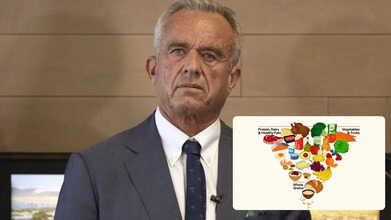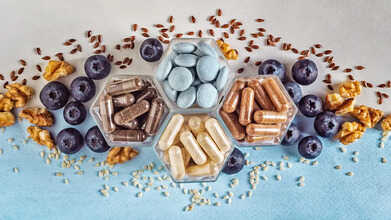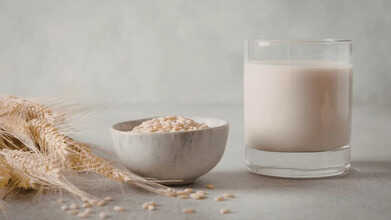- Health Conditions A-Z
- Health & Wellness
- Nutrition
- Fitness
- Health News
- Ayurveda
- Videos
- Medicine A-Z
- Parenting
Diwali Detox: Your 3-Step Reboot Plan For A Healthy Festive Season

Diwali Detox: Your 3-Step Reboot Plan For A Healthy Festive Season
As Diwali nears, the excitement and enthusiasm build up with plans for feasting, social gatherings and celebrations. But for many, the weeks leading up to Diwali also bring indulgence in rich sweets, deep-fried snacks and other tempting treats that can make you feel sluggish and bloated. How do you enjoy the festival while keeping your health in check? A detox diet before Diwali can give you a quick energy boost and cleanse your system, helping you feel your best as the festive season unfolds.
Pre-Diwali Diet Tips
Here’s a simple three-step detox plan that can make a difference.
Step 1: Declutter Your Diet
For the next few days, focus on removing processed foods, refined grains and sugary treats from your diet. This includes saying goodbye to quick snacks, pre-packaged foods, and anything high in artificial ingredients. By cutting out sugar, table salt, and processed flour, you’re giving your body a break from additives that contribute to bloating and fatigue.
Avoid: Convenience foods, sugary snacks, table salt, refined flour, white rice and processed baked goods like biscuits, cakes, and pastries. Stay away from sweetened beverages including coffee, tea, and soft drinks.
Step 2: Power Up with Nutrient-Rich Foods
Now, it’s time to introduce your body to foods that fuel and nourish. Opt for sprouted grains, legumes, fresh fruits, and vegetables that are loaded with fiber, vitamins, and minerals. Nuts and seeds, such as almonds, chia, and flaxseeds, offer healthy fats and proteins. Switching to whole grains like barley, oats, and brown rice can support digestive health and keep energy levels steady.
Include: Sprouted grains, legumes, almonds, walnuts, chia seeds, whole grains (like oats and barley), dried fruits, sea salt and natural sweeteners like honey and jaggery. Consider plant-based alternatives for dairy such as soy milk and fresh cheese.
Step 3: Refresh Your Beverage Choices
In the lead-up to Diwali, swap out your regular tea and coffee for herbal teas or green tea without milk and sugar. These teas can provide gentle detoxifying properties, helping your body flush out toxins. Herbal teas like peppermint and chamomile are especially soothing and can improve digestion, a common concern after indulging in festive treats.
Replace: Swap caffeinated drinks with herbal teas or green tea. Avoid alcohol and sugary sodas for a few days to support your liver and digestive system.
Detoxing doesn’t mean you have to miss out on festive foods. Instead, use this time to reset your eating habits and prepare your body for the festivities ahead. With these simple steps, you can enjoy Diwali feeling lighter, healthier and more energized. This plan not only helps flush out toxins but also prepares your body to handle the holiday treats with a balanced approach.
When Diwali arrives, you’ll be ready to indulge mindfully, knowing that you’ve given your body the prep it deserves.
RFK Jr.’s New Food Pyramid vs Old Food Pyramid: Know What All Has Changed In Dietary Guidelines For Americans

Credits: Canva/Politico
The U.S. Department of Agriculture (USDA) rolled out a new set of dietary guidelines on Wednesday, Jan. 7, introducing a food pyramid that looks strikingly different from what most people remember. Emphasizing protein and healthy fats while reducing the role of grains, the updated recommendations represent a clear break from previous federal guidance. The accompanying food pyramid graphic almost completely reverses the old model, both in appearance and in the food groups it promotes.
During a White House briefing, Press Secretary Karoline Leavitt highlighted the changes, saying the announcement aligned with President Donald Trump and Health Secretary Robert F. Kennedy Jr.'s mission to "Make America Healthy Again."
Also Read: New Food Pyramid 2026 Reshapes Dietary Guidelines For Americans Under RFK Jr
If you’re used to the pyramid from the early 2000s, it may take a moment to adjust to the new look. Here are some of the major differences between the old and new food pyramids.
New Food Pyramids 2026: What Does The New Food Pyramid Look Like?
The U.S. had stopped using the pyramid as a guide back in 2011, switching to a plate-style visual for dietary recommendations. Now, under RFK Jr.’s leadership at HHS, the pyramid is back—but flipped. The upside-down triangle now places the foods that should make up most of your diet at the top, while foods to eat sparingly sit at the bottom.
RFK Jr.’s New Food Pyramid vs Old Food Pyramid
It’s not just the graphic that’s changed. The hierarchy of food groups has shifted as well. Grains, once the largest and foundational part of the diet, are now the smallest segment at the bottom. Meanwhile, protein, dairy, healthy fats, fruits, and vegetables dominate the top of the pyramid.
Here’s a detailed look at RFK Jr.’s New Food Pyramid vs Old Food Pyramid and what it means for Americans, based on reporting from USA Today.
1. Focus Shift
Old Food Pyramid: Grains and carbs were the base, while proteins and fats were limited. The focus was on low-fat foods and staples like bread, pasta, and cereal.
RFK Jr.’s New Food Pyramid: Whole foods, protein, and healthy fats take center stage. Red meat, cheese, fruits, and vegetables are placed at the top, and refined grains play a smaller role.
2. Protein and Fats
Old: Saturated fats and animal proteins were discouraged. Fat was often treated as the main dietary enemy.
New: Protein and healthy fats, including saturated fats from meat and dairy, are now seen as essential. Federal nutrition leaders have officially declared an end to the “war on fat.”
3. Processed Foods
Old: Highly processed foods, added sugars, refined carbs, and chemical additives were allowed in moderation.
New: There’s a strong push to reduce ultra-processed foods, added sugars, and refined carbs. The emphasis is now on minimally processed, real foods.
4. Dairy
Old: Low-fat or skim dairy was recommended; full-fat options were generally discouraged.
New: Cheese and other dairy products are now at the top of the pyramid, allowing for full-fat milk in both general diets and school meals.
5. Sugar and Additives
Old: Sugar intake was suggested to be limited, but highly processed foods weren’t heavily flagged.
New: Added sugar is more strictly controlled, and processed foods are clearly marked as foods to minimize.
6. Overall Approach
Old: The diet centered on lowering fat, balancing calories, and relying heavily on plant-based staples such as grains.
New: The focus is on nutrient-rich, protein-heavy meals, healthy fats, whole foods, and cutting down refined carbohydrates. The guidelines aim to address obesity, chronic disease, and overall health.
How Does The New Pyramid Reflect Dietary Trends?
The new food pyramid, unveiled by Health Secretary Robert F. Kennedy Jr., signals a major shift in U.S. nutrition advice, emphasizing more protein and healthy fats while reducing grains. This change mirrors growing trends in American diets, where high-protein eating patterns and skepticism of high-carb, ultra-processed foods are increasingly common, according to USA Today.
Practically, protein and dairy, especially full-fat dairy, now dominate the pyramid, replacing the previous grain-heavy base. Saturated fats are no longer demonized; instead, they are considered healthy in moderation. Federal nutrition leaders have officially ended the “war on fat.” These updates also reflect recent survey findings showing that high-protein diets are a top trend in the U.S., with most Americans actively trying to increase their protein intake.
Supplements, Gummies, Or Whole Foods? Here’s What Experts Recommend

Credits: Canva
In a world where colourful vitamin gummies line supermarket shelves and powders promise instant wellness, many people are left wondering: should I really rely on supplements, or is eating well enough? Experts say the answer isn’t as simple as choosing one over the other.
Why Natural Foods Come First
Dr. Hari Kishan Boorugu, Consultant Physician and Diabetologist at Yashoda Hospitals, Hyderabad, emphasizes that “whole, natural foods should always come first.” Fruits, vegetables, whole grains, nuts, seeds, fish, yogurt, and healthy oils are packed with vitamins, minerals, fibre, antioxidants, and other plant compounds that work together to support digestion, immunity, heart health, and gut microbiome balance. “Supplements can’t fully replicate the synergy of nutrients found in real foods,” he adds.
Supplements, including tablets, capsules, powders, and even gummies—are meant to fill specific gaps. They are particularly useful for people with diagnosed deficiencies, dietary restrictions, pregnancy-related needs, ageing-related bone health, or medical conditions that affect nutrient absorption. But Dr. Boorugu cautions that “self-prescribing or overusing supplements can lead to nutrient imbalances or even toxicity, especially with vitamins A, D, E, and K.”
The Truth About Gummies
Gummies have become popular for their taste and convenience. Yet, experts warn that they are not a substitute for a balanced diet. “Many gummies contain added sugar and inconsistent doses of nutrients,” Dr. Boorugu explains. They can support your nutrition, but only when used responsibly and under medical guidance.
Supplements As Support, Not Shortcuts
Ruchika Rajbans, Founder & CEO of Arechar Group and creator of Vitagoli, says people often ask her, “Do I really need supplements? Isn’t eating well enough?” Her answer: ideally, yes—food should cover your nutritional needs—but real life often interferes. Stress, lack of sleep, overworking, and hormonal changes can affect how well your body absorbs nutrients.
“Supplements are gap fillers, not meal replacements,” Ruchika explains. “Whether in gummies, tablets, or powders, what matters is the quality of the ingredients and whether there’s evidence backing their benefits.” She adds that wellness isn’t about chasing trends or formats; it’s about understanding your body, reading labels carefully, and making informed choices.
Experts agree that balance is key. Prioritize a varied, nutrient-rich diet, maintain a healthy lifestyle, and use supplements only when necessary, preferably with medical guidance. Real nutrition starts on your plate—not in a capsule or gummy.
What Is ‘Oatzempic’? TikTok’s New Weight-Loss Trend Explained

Credits: Canva
If you scroll through TikTok or Instagram these days, chances are you have come across videos of people blending oats with water or juice and calling the drink “oatzempic”.
The term is clearly inspired by Ozempic, a prescription drug mainly used to treat type 2 diabetes and known for reducing appetite. Clips featuring the oat-based drink often promise quick weight loss, long-lasting fullness, and a “natural substitute” for medication. But does oatzempic have any scientific backing? In short, no. Here’s a closer look at why.
What Is Oatzempic?
There is no fixed formula for oatzempic. Most videos show people blending one or two tablespoons of rolled oats with a glass of water. Some add lemon or lime juice, cinnamon, or soak the oats beforehand. Oats are high in beta-glucan, a form of soluble fibre that turns gel-like when mixed with liquid. The idea is that drinking this mixture will help you feel full and curb hunger.
Many TikTok creators suggest replacing breakfast with oatzempic. Others recommend drinking it mid-afternoon to avoid overeating later.
Oatzempic: What Happens When You Drink It?
As per The Independent, many people online say they feel fuller after drinking oatzempic, which makes sense. Oats contain beta-glucan, a soluble fibre that forms a thick gel in the digestive tract. This slows digestion and can increase feelings of fullness. Strong evidence shows that diets rich in viscous soluble fibre, such as that found in oats, can modestly improve appetite control, blunt blood sugar spikes after meals, and support healthier cholesterol levels.
That said, oats are not unique in this respect. Foods like apples, citrus fruits, flaxseeds, barley, psyllium husk, and legumes such as beans and lentils also contain soluble fibres that behave in a similar way in the gut, promoting fullness and overall health. So yes, oats can help you feel satisfied. But feeling full alone does not equal lasting or meaningful weight loss.
Sustainable weight management depends on balanced eating and regular physical activity, not just appetite suppression.
Has Oatzempic Actually Been Studied For Weight Loss?
No. There are no clinical studies examining the “oatzempic drink” for weight loss, appetite regulation, or long-term health effects. There is no agreed recipe, no standard quantity, and no research following its use over time.
If someone loses weight while drinking it, it is difficult to know whether that change is due to oatzempic itself, reduced calorie intake overall, or other lifestyle adjustments happening at the same time.
Oatzempic: Are There Downsides To Consider?
For most people, drinking small amounts of oatzempic is unlikely to be harmful. Still, there are a few points worth keeping in mind:
- It is not a complete meal. Oatzempic lacks adequate protein, healthy fats, and several essential nutrients. Regularly replacing meals with it could lead to nutrient deficiencies or under-eating
- Increasing fibre too quickly can cause discomfort. People who are not used to high-fibre diets may experience bloating or digestive issues, particularly if they are not drinking enough fluids
- The name itself can be misleading. Calling it “oatzempic” encourages comparisons with a prescription drug, which may wrongly suggest it has similar effects
- It may delay proper care. Relying on a viral drink instead of seeking evidence-based nutrition or medical advice could stop people from getting the support they actually need.
© 2024 Bennett, Coleman & Company Limited

